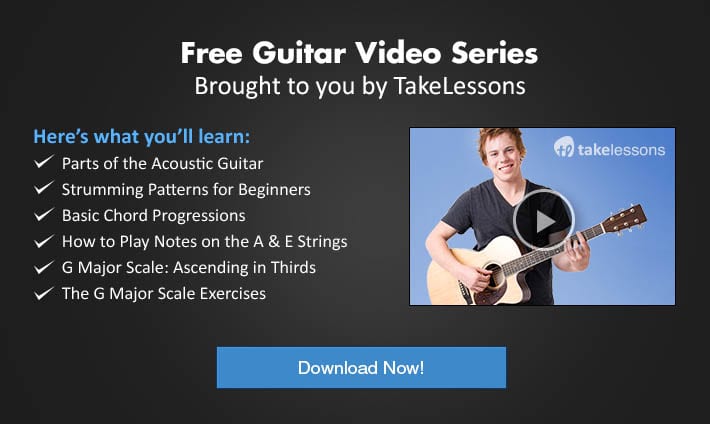Ready to learn guitar chords? Guitar teacher Joe H. shares his secrets to mastering guitar chords…
If you are a beginner guitar player, learning guitar chords is essential. But don’t worry, it’s not hard to learn the basics and once you do, you’ll be able to play all sorts of tunes.
In this post, we will give you some tips on how to get started with chords guitar playing. So read on and get started today!
What Guitar Chords Should I Learn First?
Although learning guitar chords is beneficial in general, some of the first chords to learn on guitar for beginners are:
- Em
- G
- C
- D
Of course, you’ll learn all these chords (and then some!) if you sign up for guitar lessons. You’ll learn the guitar chords along with plenty of other helpful tips, like what you see in the video below:
https://www.youtube.com/watch?v=WfZ64yEGPok
What is the Best Way to Learn Guitar Chords?

Jodie Griggs/The Image Bank/Getty ImagesThe guitar is incredibly versatile accompaniment instrument. It can deliver many effects, from driving strumming to delicate fingerpicking. It is essential that a guitarist have a solid vocabulary of chords to draw from to do this. Let’s be honest for moment: There are hundreds of chords! The good news is that some are more essential than others (more on that later). The following ten tips and tricks for learning guitar chords should help get them in your head and under your fingers in no time!
1. Have a Plan
When you are just starting to understand the first chords to learn on guitar, it is important to make a practice plan. You will want to look honestly at the time you have each week to dedicate to practicing and choose realistic goals for yourself. You may choose to try to learn three new chords a week (a reasonable goal for beginners), maybe five, or maybe even just one. The most vital thing is that you set a goal based on your personal learning style and current abilities!
What are some chords to learn on guitar?
As any guitar player knows, chords are an essential part of playing the instrument. They provide the harmonic foundation for a song, and can be used to create a wide range of sounds and textures.
While there are literally hundreds of different chords that can be played on guitar, there are a few that every player should learn. Some of the most basic chords include the major and minor triads, as well as the seventh chord. These chords can be played in a variety of positions on the fretboard, and can be combined to create more complex sounding progressions.
With a little practice, any player can figure out how to learn chords on guitar.
2. Have Excellent Resources
When learning anything, it’s very important to have reliable sources. Ask a friend or even better, a guitar teacher, for some recommendations. Most beginner guitar method books have a limited chord resource in the back that can help you begin. Once you progress beyond the basic chords however, you will definitely want to invest in a more advanced resource such as a chord dictionary where you can find just about any chord you could imagine!
3. Learn to Read Chord Diagrams
Chord diagrams (a.k.a. chord charts) are visual representations of a portion of the guitar neck in which all the information necessary to learn a chord can be written. They are helpful when learning chords on guitar. These are the most common and useful way of quickly notating chords so we can instantly relate them to the guitar. They are a must!
4. Start with Open Chords
Open chords are essential knowledge for all aspiring guitarists. These are chords in which one or more of the strings are played open (without being fretted). Because we don’t need to push down all of the notes in the chord it can be easier to get a clear sound as opposed to chords with no open strings.
5. Know What You Need To Know
It is important when you are deciding to learn guitar chords that you know what types of chords will lend themselves to the type of music in which you are interested. For instance, styles such as folk, pop and rock will stick with mostly with open and barre forms of major, minor and some basic seventh chords. Styles such as jazz and progressive rock require a more extensive understanding and knowledge of extended chords such as major, minor and dominant 9th, 11th and 13th chords and their many variations.
6. Make Sure You Are Practicing Correctly
You are going to want to make sure you build good habits when practicing chords. Just because your fingers are in the correct places does not mean you will be sounding the chord correctly. You can assess this by playing each string in the chord one at a time and listening for muffled or muted notes. If you hear a note that sounds incorrectly, you will want to adjust your fingers. Remember it is important to push the fingertip straight into the fretboard whenever possible to prevent accidentally muting strings adjacent to those intended. You can always move your thumb further down the back of the neck to help your fingers more easily hold down the upper strings at the proper angles.
7. Understand Movable Shapes: Barre Chords
Keep in mind that any chord shape you learn that does not contain any open strings (barre chords) can be moved and used as the same type of chord except under a different root (The note a chord is named after). For instance, if you move every note in an F Major Barre Chord up 2 frets from the 1st the 3rd fret, that same shape now lets you play a G Major Chord. If this is lost on you at the moment, check out tip #9!
8. Give Context To What You are Learning
Make sure you pick out some songs that interest you and will really motivate you to learn. Finding songs that you like with chords you haven’t learned yet is a great way to stay on the path and keep yourself driving forward!
9. Learn Some Music Theory
Having even a basic understanding of how chords are built will help you figure out how to play chords without needing a resource to show you. Music theory empowers you to not be just a guitarist but a full-blown musician as well!
10. Find a Great Teacher
Truly the best approach to learn chords is to have an excellent teacher to teach you in a way custom tailored to you!
What is the Easiest Way to Learn Guitar Chords?
What is the best way to learn guitar chords? For beginning guitarists, learning chords can seem like a daunting task. However, with a little practice and patience, anyone can learn the basics of guitar chord shapes.
One of the best ways to learn chords is to start by memorizing the most common chords used in popular songs.
The major and minor chords are usually the first ones that new guitarists learn, as they are used in a wide range of songs across genres. Once you have a few major and minor chords under your belt, you can start learning more advanced chords such as 7th and 9th chords.
These chords can add more interest and texture to your playing. In addition, there are many online resources that can help you as you are learning guitar chords, including video lessons and interactive chord diagrams.
With a little time and effort, you’ll be playing chords like a pro in no time!
Can I Teach Myself Guitar?
Many people who want to learn guitar ask themselves the question, “Can I teach myself guitar?” The answer to this question is yes, you can teach yourself guitar. However, it will require some dedication and effort on your part.
How Can I Learn to Play Guitar By Myself?
The first thing you need to do is find a good guitar instructional book or video. These can be found at your local music store or online. Once you have a good instruction book or video, sit down and dedicate some time each day to practicing.
The foundation of playing the guitar is learning the basics. Focus on learning basic chords, strumming techniques, and fingerpicking exercises.
Start with simple chord progressions and work your way up to more complex ones. Practice them over and over until they become second nature. Don’t worry about playing fast, just focus on accuracy and timing.
Once you have the basics down, you’re on your way to playing more complex songs.
It is also important to find an experienced guitar player who can help you when you get stuck. With some hard work and dedication, you can teach yourself to play the guitar.
How Long Does it Take to Learn Guitar Chords?
The amount of time you spend practicing guitar chords every day plays a crucial role in how quickly you learn. The more consistently and frequently you practice, the faster you will learn. We recommend daily practice sessions of at least 30 minutes, but preferably closer to an hour.
However, don’t get discouraged if you can’t practice every day for that long. Just remember that consistent practice is key, even if it’s only a few minutes a day.
Another factor that affects how long it takes for learning guitar chords is your individual learning ability. Some people are naturally more rhythmically inclined and may find learning guitar chords more comfortable.
However, not being born musically inclined does not mean you can’t learn the guitar— with dedicated consistent practice; anyone can learn to be proficient at playing chords.
How to Learn Guitar Chords: Beginner Tips to Try
Learning guitar chords can be a daunting task, but it doesn’t have to be. With the right tips and some practice, you can start playing your favorite songs in no time.
With these ten tips in mind, remember: the secret to learning guitar chords is repetition. Try to play your newest chords at least a couple times each day or at least every time you pick up the guitar. Good luck!
Looking for a guitar teacher who can help you learn guitar chords? Find your perfect guitar teacher today and make your guitar-playing dreams come true!
Follow these simple steps to get started on the path to chord mastery. What are you waiting for? Learn chords for guitar today!

Joe H. is a guitar and music theory instructor in White Plains, NY. Teaching since 2009, he received a degree in Jazz Studies from SUNY Purchase Conservatory of Music and can help students specialize in blues or country guitar. Learn more about Joe here!
Photo by Dustin Gaffke
Suzy S.

